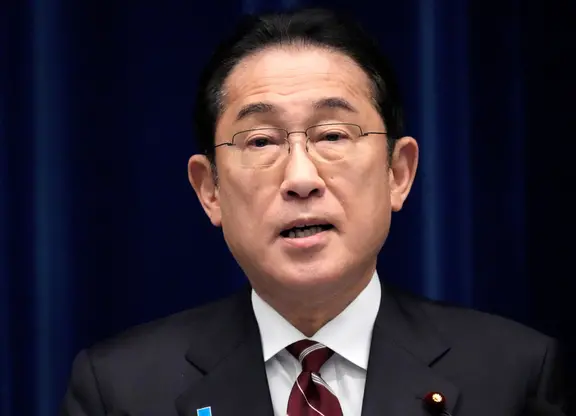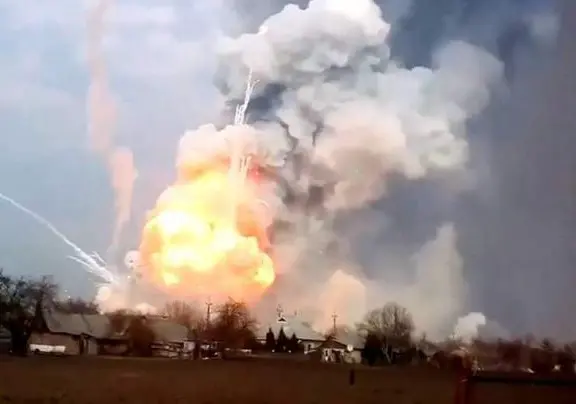The British government has signaled it is ready to back US military action against Syria, saying it is "highly likely" the Assad regime used chemical weapons on its own people and that such action could not go unchallenged.
British Prime Minister Theresa May's senior ministers agreed on the need for action at a Cabinet meeting on Thursday, but Downing Street did not specify what measures the UK would take.
Ministers said there was need to "deter the further use of chemical weapons by the Assad regime," and alleviate the humanitarian situation, a Downing Street statement said.
According to the statement, May described the attack as a "shocking and barbaric act which killed up to 75 people, including children, in the most appalling and inhumane way." Britain would work with United States and France to coordinate an international response, the statement said.
May spoke with US President Trump Thursday night about the international response to Syria, and they "agreed that the Assad regime had established a pattern of dangerous behavior in relation to the use of chemical weapons," according to a Downing Street statement.
Earlier on Thursday, Syrian President Bashar al-Assad warned the West against attacking Syria, saying accusations about the suspected chemical attack on Douma were "fabricated."
French Prime Minister Emmanuel Macron claimed that France had "proof" the Assad regime used chemical weapons in Douma at the weekend, and would support any US action. He said earlier this week that France was ready to attack the "chemical capabilities" of the Assad regime.
Trump has sent mixed messages on his country's readiness to act. On Wednesday, Trump appeared to suggest airstrikes were imminent, warning Russia, Syria's key ally, to "get ready" for military action. But after being criticized for apparently telegraphing US intentions, Trump on Thursday attempted to blur the timing of any potential airstrikes on Syria.
"Never said when an attack on Syria would take place. Could be very soon or not so soon at all!" he tweeted, without ruling out attacks.
Any potential strike against Syria could be carried out by extensive US and UK military assets already in the region, including two US Navy destroyers armed with Tomahawk cruise missiles. British media reported Wednesday that May has also ordered British submarines to move within missile range of Syria.
International warnings
The suspected use of chemical weapons has drawn the West back into Syria's seven-year conflict.
There are concerns, however, that further international intervention risks a confrontation between Russia and the United States. Russia has provided Assad with strong military backing.
Speaking Thursday, Assad issued a strong warning about strikes against Syria.
"Any possible action will only cause more instability in the region and threaten international security and peace," Syrian state TV quoted Assad as saying at a meeting Thursday with a high-level Iranian delegation in Damascus.
Russia has called for a United Nations Security Council meeting on Syria on Friday. Earlier on Thursday, the Russian ambassador to the United Nations, Vassily Nebenzia, said that he believes any strike against Syria would violate the UN charter.
"We hope that there will be no point of no return, that the US and the allies will refrain from military action against sovereign states," he said.
While Turkish President Recep Tayyip Erdogan has condemned Assad for killing "innocent kids in the Douma chemical attack," he also warned against using Syria as a place to flex military muscle.
Assad regime has 'track record' of using chemical weapons
The UK Cabinet agreed Thursday "that the Assad regime has a track record of the use of chemical weapons and it is highly likely that the regime is responsible for Saturday's attack," according to the Downing Street statement.
"The Prime Minister said it was a further example of the erosion of international law in relation to the use of chemical weapons, which was deeply concerning to us all. Following a discussion in which every member present made a contribution, Cabinet agreed it was vital that the use of chemical weapons did not go unchallenged," the spokesperson added.
Macron and German Chancellor Angela Merkel have also expressed concern about the "erosion" of the international ban on chemical weapons, and have spoke to each other on the matter, according to a German government statement Thursday.
Merkel has however ruled out joining any possible strikes against Syria. Speaking Thursday, Merkel said that the "whole spectrum of measures must be considered" when responding to the use of chemical weapons, adding: "Germany will support all activities with the UN security council."
It remains unclear whether May would seek parliamentary support for any UK involvement in airstrikes. May is not required by law to consult the House of Commons, but by convention, members of Parliament expect to be consulted.
(CNN)
 简体中文
简体中文





















